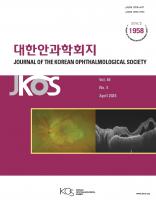 |
 |
Aims and scope
- Page Path
-
- HOME
- ABOUT
- Aims and scope
The primary mission of JKOS is to provide essential knowledge for ophthalmology residents, general ophthalmologists, and ophthalmology subspecialists to further elevate the level of ophthalmology by publishing creative, original, and clinically significant research under rigorous peer review. The ultimate goal of JKOS is to contribute to human’s health and well-being by improving and educating the science and technologies of ophthalmology.
JKOS has kept its reputation in continuing to be the main medium facilitating communication between ophthalmology specialists and readers. Korean board-certified ophthalmologists, ophthalmology residents, and physicians practicing ophthalmology-related medical care have been the general readers of JKOS and this tradition will certainly continue. The JKOS has a larger reader population than the Korean Journal of Ophthalmology (KJO), an English-only journal published by KJO. Being the major ophthalmology journal in Korea, the JKOS has promoted lifelong learning for ophthalmologists and encouraged ophthalmology residents by allowing them more publishing opportunities. The JKOS is distributed to members of the KOS, medical schools, libraries, and many other institutions in Korea and abroad to promote the expansion of Korean ophthalmology and academic exchanges among KOS members and the international ophthalmology society.
The JKOS emphasizes in identifying and researching characteristics eye conditions and diseases in Korea. Previously unpublished cases and diseases specific to Koreans are published through case report studies. We welcome epidemiologic studies using the Korea National Health and Nutrition Examination Survey (KNHANES), which is a nationwide, population-based, cross-sectional health examination and survey conducted regularly conducted by the Division of Chronic Disease Surveillance, Korea Centers for Disease Control and Prevention, and the Ministry of Health and Welfare in collaboration with the Epidemiologic Survey Committee of the Korean ophthalmology society. The manuscripts submitted to JKOS are qualified by an authoritative peer review system consisting of experienced specialists within each subspecialty. We support accessibility through the online submission system.
All or part of the published contents are indexed by KoreaMed, KoreaMed Synapse (http://synapse.koreamed.org), CAS, Google Scholar, CrossRef, KoMCI, KCI, EBSCO, and ProQuest. The full text is available from KoreaMed Synapse and the journal’s own homepage, http://www.joos.org. Open access is available since year 1958 issue (Vol.1, No.1). JKOS deals with clinical and basic scientific research and other relevant articles that may relate to ophthalmology. The KOS especially welcomes submissions of papers presenting culture-specific symptoms and epidemiologic studies on the Korean population. JKOS publishes original articles, case reports, letters to the editor, reviewer and commentaries requested by the editor, and is published on the 15th of each month.

-
Journal of
the Korean
Ophthalmological
SocietyPrint ISSN: 0378-6471
Online ISSN: 2092-9374
-

-
Impact Factor0.1
-
-
-

-
















